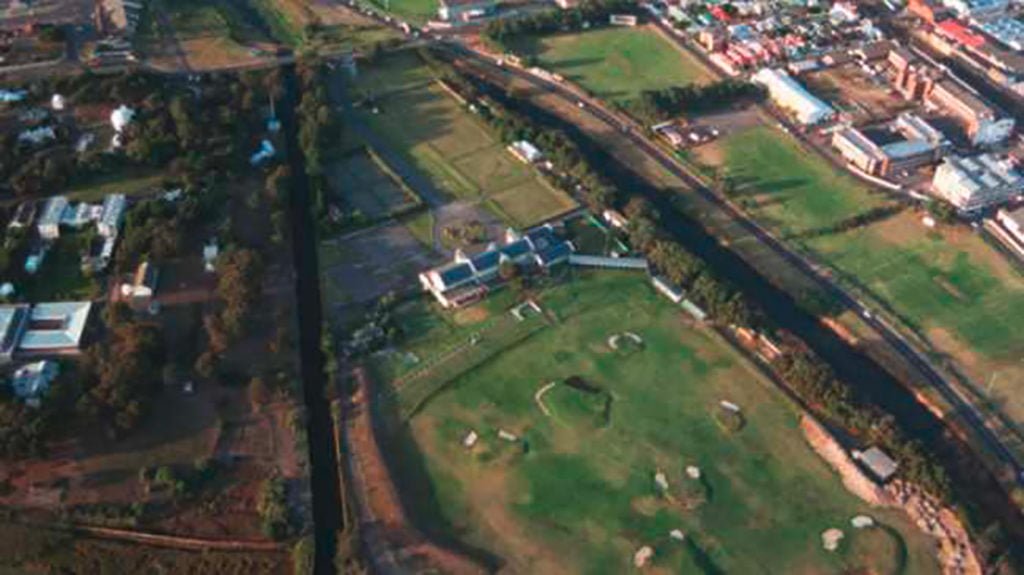An aerial view of The River Club. Observatory residents fear a proposed R4 billion redevelopment of the club will mean the loss of public open space along the Liesbeek River. File picture: Andrew Ingram.
NEWS | By Bulelwa Payi | Nov 1, 2020
CAPE TOWN – In a last-ditch effort to halt the controversial River Club redevelopment, a plea has been made to billionaire Jeff Bezos for assistance as tech giant Amazon will be the anchor tenant if the multimillion-rand project is completed.
Documents show Amazon is the major tenant at the contentious redevelopment which civic organisations and representatives of the Khoi and San indigenous people have challenged.
The Municipal Planning Tribunal (MPT) approval has given Liesbeek Leisure Properties Trust (LLPT) which bought the site from Transnet, a government parastatal, the green light to build a 150 000m ² development, comprising retail, offices, flats and hotel.
The Observatory Civic Association ( OCA) wrote to the Amazon chief executive who has created a fund as part of his $10 billion (R162bn) climate change strategy to help climate scientists and activists, to reconsider the company’s involvement in the project.
Association chairperson Leslie London said having a project on the banks of the Liesbeek, that required 400 000 cubic metres of infill to lift the site above a flood plain; this would involve probably upward of 20 000 large truck trips.
London said the environmental impact would be “enormous”. “The development also infills a river, the original track of the Liesbeek, and has been slated by the City’s department of environmental management as not consistent with policies on climate change.”
In a letter to Bezos, the association said Amazon’s investment would “forever be associated with environmental destruction, greed overprotection of heritage and the environment and a complete abdication of any commitment to addressing climate change”.
“We urge you to reconsider your involvement in the project and withdraw. We would love to hear a public statement from Amazon agreeing with us and the tens of thousands of South Africans who believe this development is simply wrong.”
Documents submitted during the Basic Assessment Report process name Amazon as a major tenant as does the rezoning document.
According to the sketches, the Amazon precinct would loom over the northern parts of the sites, with six buildings varying between 32m and 45m in height, and underground parking of about 1 700 bays.
Bezos did not respond to questions by the time of going to print.
However, spokesperson for the LLPT Jody Aufrichtig said it was not in a position to provide information on any prospective tenants while formal processes were being concluded.
He said construction was expected to start in January dependent on all approvals being in place.
Meanwhile, organisations including the OCA and Khoi and San groups have lodged appeals with the tribunal, raising questions about the process, and also labelled its decision as “misguided, unwise, short-sighted and legally flawed”.
In a meeting held on September 18, the tribunal approved the rezoning application for the River Club redevelopment in Observatory.
“This site is a place of deep spiritual meaning. This is a nexus of our heritage, our relationship with the stars, the river, and sacred animals.
“It is where colonial conquest began. And where it was defeated,” said the Goringhaicona, an organisation that lodged an appeal.
The OCA said the site was located in a floodplain which was prone to regular flooding.
“It plays a vital role in terms of ecosystem services. The argument made by the applicant and endorsed by the City and tribunal, that a diverse range of land uses is appropriate, is flawed.”
The association further noted that it would not be widely accessible to the public as an open space amenity as only one-third of the site would be open space.
While the site was close to Cape Town CBD, it would require an entire new road to provide it with access from the northern side of the property, the association also argued.
The organisations also said that when the tribunal made the decision, it should have been guided by the principle of spatial justice, which required that land-use planning should redress past spatial and other development imbalances through improved access to, and utilisation of land.
The association also submitted that the decision did not align with legislation such as the National Heritage Resource Act and the City of Cape Town’s Flood Plain & River Corridor management Policy.
Environmental and green business lawyers representing the organisation, Cullinan and Associates, also noted in a submission on behalf of association that the approvals were the outcome of an “unfair administrative process” which did not enable interested and affected parties to comment on important documents considered by the tribunal.
“The approvals have been granted at a time when humanity is trying to address the rapidly increasing impacts of climate change, catastrophic declines in biological diversity, and a pandemic that is dramatically reducing the demand for office space.
“It is also a time when increasing recognition is being given to the rights of first nations in South Africa after years of marginalisation process,” the lawyers noted.
The Local Spatial Development Plan for the area did not permit a mixed-use development in the flood plain, it added.
City spokesperson Luthando Tyhalibongo said the City’s Planning Appeals Advisory Panel would consider all appeals pertaining to the rezoning decision.
He said the City had hosted a public participation process concerning the application for the rezoning of the River Club development from September 14 to October 18, 2018.
Weekend Argus


